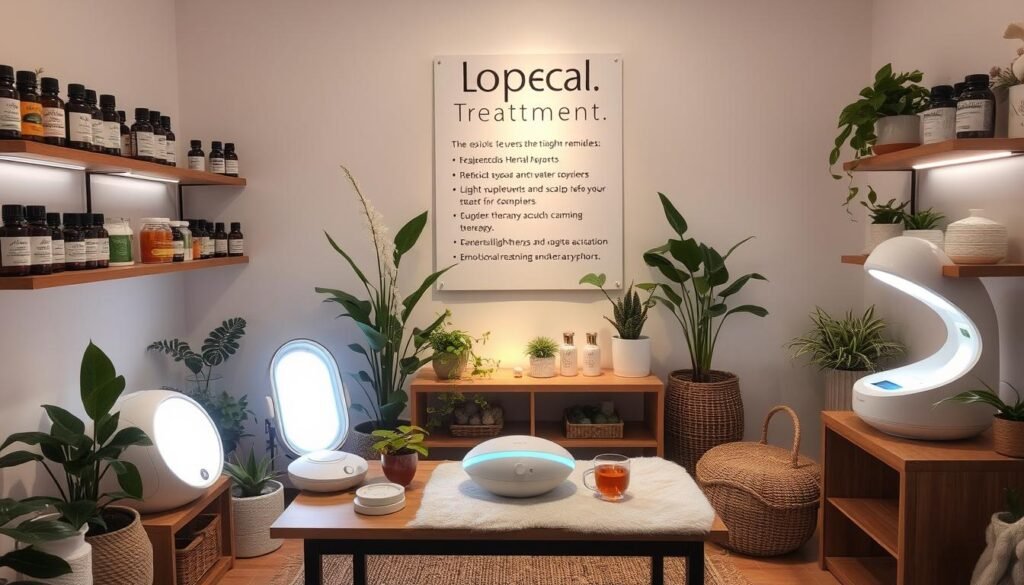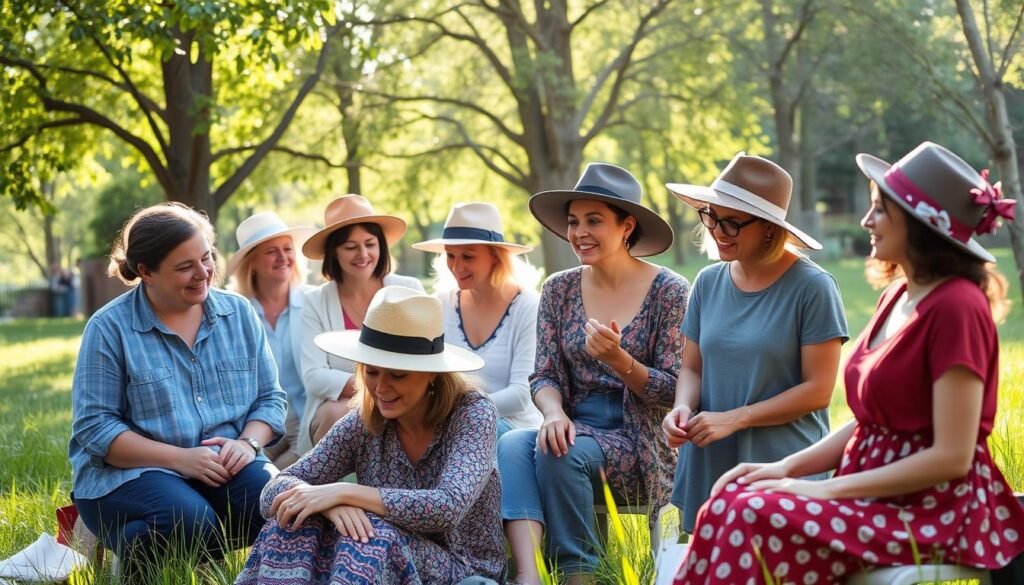Nearly 20 million Americans are living with alopecia, an autoimmune disorder. This condition can cause significant emotional pain. Dealing with alopecia affects more than just how a person looks. It also impacts their mental health and quality of life. Getting the right emotional support is key for those with alopecia. Research shows that hair loss can lead to mental health issues, so it’s important to treat both the mind and body.
It’s important to understand how alopecia makes people feel. Then, finding ways to cope is the next step. Getting support from friends, family, or groups can help a lot. Using different self-care methods can also boost a person’s confidence. This helps them to keep going strong, even when things are tough.
Key Takeaways
- Alopecia affects nearly 20 million Americans, emphasizing the importance of emotional support.
- The psychological impact of alopecia can significantly harm self-esteem and quality of life.
- Emotional support is crucial in helping individuals cope with the challenges of hair loss.
- Research suggests a strong link between alopecia and mental health disorders.
- Alopecia self-care strategies can empower individuals to maintain their well-being.
- Building a support network enhances resilience and aids in emotional recovery.
Understanding Alopecia and Its Impact
Alopecia is a condition causing hair loss in many people worldwide. It shows up in forms like alopecia areata, totalis, and universalis. Each has different symptoms and effects. Alopecia can hit anyone at any age, adding emotional and social challenges.
Research finds about 2.1% of people will face alopecia areata during their life. It affects all genders and ethnic groups. Some studies hint it’s more common in women. Knowing this makes those with hair loss feel less alone.
The cause of hair loss is often the body’s immune system attacking hair follicles by mistake. Knowing about Alopecia shows why support is crucial. It helps deal with the hurt to one’s self-image and social life. This can make maintaining self-esteem tough, causing anxiety and depression.
Finding Hair Loss Solutions is key for many. These can be medical treatments or lifestyle changes for better mental health. Recognizing the emotional side of hair loss helps. It builds support and a community for those with alopecia.
Emotional Support for Alopecia: Building a Support System
Finding emotional support is very important when dealing with alopecia. Talking about your feelings can help you deal with tough emotions like shame and anxiety. It’s good to share these feelings with friends, family, or professionals to build a strong support base.
The Importance of Communicating Feelings
Talking about how you feel because of alopecia is key to healing emotionally. Quite a few people feel alone due to their hair loss. This can make feelings of embarrassment or inadequacy worse. By sharing your thoughts and what you’re going through, you can make connections that help you feel less lonely. When friends or family really listen, it helps you feel understood and supported.
Finding Support Groups and Online Communities
Support groups are extremely helpful for those dealing with alopecia. These groups can be either in person or online, letting people connect with others in similar situations. Groups like the National Alopecia Areata Foundation offer support locally. Online forums and social media groups give a space where people can safely share advice and experiences.
- Face-to-Face Support Groups
- Online Support Groups
- Social Media Community Groups
- Crisis Helplines
- Local Alopecia Resources
Reaching out to Alopecia Community Resources can do more than just help you talk about your struggles. It can lead to long-lasting friendships and a network of support. These connections make you stronger and enrich your journey in dealing with alopecia.
Coping with Alopecia: Strategies for Mental Resilience
Dealing with hair loss is tough. Coping with alopecia becomes key. It’s vital to build mental toughness. Techniques like cognitive-behavioral therapy (CBT) are very helpful. They teach people to change how they think and feel about their hair loss. CBT helps replace negative thoughts with positive ones, improving mindset.
Journaling is another good way to cope. It lets people write out their feelings and experiences daily. This can help them see how their thoughts change over time. It boosts emotional growth.
Having hobbies can also help take your mind off things. Activities like art, reading, or gardening provide a break and build a sense of achievement. Starting to be thankful for the good things can also make a big difference. It helps shift focus from the tough times to the good, boosting happiness.

Experts in psychology stress the importance of these methods. They suggest using several strategies together, including having a strong support circle. Meeting others who understand what you’re going through makes a big difference. It helps to know you’re not alone. Looking for resources on coping with alopecia, like support groups or expert advice, is also a great idea.
Alopecia Treatment Options: Exploring Solutions
Alopecia brings unique challenges. Many look for effective treatments. This section looks at medical and alternative Alopecia solutions.
Medical Treatments: Pros and Cons
For hair loss, medical treatments are start point. Options include corticosteroids, topical immunotherapy, and laser therapy. It’s key to understand their effects and side effects.
- Corticosteroids: Given through injections, they can lower inflammation and help hair grow back in some cases.
- Topical Immunotherapy: Aimed to cause an allergic reaction, this treatment might help with hair growth. However, it’s not for everyone.
- Laser Therapy: A non-invasive choice, this method uses low-level lasers to activate hair follicles. Yet, outcomes can differ.
Talking to a dermatologist is wise. They can help you understand your options based on your health and life.
Alternative Approaches to Hair Loss Solutions
Non-medical paths for hair loss are gaining attention. Wigs, hairpieces, and scalp tattooing are popular. They fit personal styles and improve confidence.
- Wigs and Hairpieces: These offer different styles and an instant confidence lift.
- Scalp Tattooing: A cutting-edge method, it creates a hair-like look for those with significant hair loss.
Cosmetology experts highlight how these choices boost confidence. Stories from users highlight their transformative impact.

Alopecia Lifestyle Adjustments: Embracing Change
Dealing with Alopecia means finding new ways to feel good and accept yourself. Fashion and makeup are great for expressing yourself. They help boost confidence and change how you look to match who you are inside.
Fashion and Makeup Tips for Hair Loss
Choosing the right fashion accessories and makeup tricks is key to feeling great about yourself. Here are some top tips:
- Try cool hats or scarves that show off your style. They add a fun touch to any look.
- Add headbands or hair wraps to your outfits. They’re comfy and stylish.
- Use bold eye makeup to highlight your eyes. Bright lip colors also help balance your face.
- Look into adjustable wigs for flexibility and comfort. There are many quality options for all events.
These creative ideas can boost your style and mood when facing Alopecia. For more help with hair loss changes, check this resource.
Adapting Daily Routines for Comfort
Changing your daily habits can make you feel better mentally. Starting your day with self-care and positive actions is important. Here are some ideas:
- Start a skin care routine for healthy, bright skin. Staying hydrated and protecting your skin from the sun is crucial, especially under headwear.
- Make time for mindfulness or meditation to lower stress and stay calm.
- Surround yourself with positive quotes or pictures that inspire self-love.
- Exercise regularly to boost your mood and health.
Adapting in these ways can make you stronger and happier as you manage Alopecia. Embracing these changes leads to a better life.

Alopecia Self-Care Strategies: Prioritizing Mental Health
People with alopecia often face tough emotions. It’s key to take good care of your mental health. Practices like meditation and yoga help a lot with stress. They make you focus on now, bringing peace and strength. This support is crucial for anyone dealing with alopecia.
Mindfulness and Relaxation Techniques
Mindfulness means being fully aware of our thoughts and feelings, without being hard on ourselves. Using meditation or yoga helps in many ways:
- Enhances emotional regulation
- Reduces anxiety and stress
- Promotes a greater sense of self-acceptance
- Fosters a tranquil mindset
Adding mindfulness to your routine supports traditional help. It offers a complete way to manage stress from alopecia.
Physical Activity and Its Benefits
Being active is important for staying emotionally healthy. Exercise makes you feel good by releasing endorphins. A regular exercise plan can lead to:
- Improved mood and reduced feelings of depression
- Increased energy levels
- Better stress management
- Enhanced self-esteem and body image
It’s important to find a fitness routine that you enjoy. This might be walking, swimming, or group exercises. Picking an activity you like can really change how you feel and deal with stress.
| Activity | Benefits | Suggested Duration |
|---|---|---|
| Yoga | Promotes relaxation, flexibility, and mental focus | 30-60 minutes, 2-3 times a week |
| Walking | Enhances cardiovascular health, boosts mood | 30 minutes daily |
| Swimming | Low-impact workout, improves physical strength | 45 minutes, 2 times a week |
| Cycling | Increases stamina, promotes mental clarity | 30-45 minutes, 3-4 times a week |
Focusing on these self-care strategies builds a strong base for emotional well-being. This helps people with alopecia handle their challenges better.
Embracing Alopecia: Building Confidence and Self-Esteem
Embracing Alopecia is all about accepting oneself and boosting confidence. People with hair loss often battle with how they see themselves and their emotional health. By adopting Alopecia Confidence-Building Techniques, they can promote a better body image and love themselves more.
Self-Acceptance Techniques
It’s key to accept yourself when dealing with Alopecia. To improve self-acceptance, you can:
- Positive Affirmations: Repeating encouraging words helps build self-esteem and fosters a positive outlook.
- Mindfulness Practices: Mindfulness helps focus on the now, easing worries about how one looks.
- Creative Expression: Using art or writing as an outlet lets people express their feelings about losing hair.
These activities greatly strengthen emotional toughness and help accept oneself despite appearance changes.
Empowering Personal Stories and Testimonials
People living with Alopecia share their stories, showing the strength in acceptance. These stories prove that each person’s battle with hair loss is different. They highlight the courage and empowerment that comes from self-acceptance, inspiring many.
For example, some find peace and freedom in being true to themselves. This boosts their self-assurance.
These stories give hope, showing we’re not alone in this. Accepting Alopecia turns struggles into strengths, leading to a happier life.
Alopecia Community Resources: Finding Help and Connection
Dealing with alopecia can be tough. Joining a community helps a lot. Local organizations offer support, resources, and workshops. They help you understand alopecia better and meet others who are also dealing with hair loss. This can help reduce loneliness and boost your confidence.
Local Organizations and Support Networks
Local groups create a supportive atmosphere for those with alopecia. They organize meet-ups and provide emotional support along with other activities. Places like community centers host gatherings. These events are great for meeting people and feeling more connected, which is essential for your emotional health.
Online Resources for Education and Support
The web is a great place to find help and learn about alopecia. There are many sites and forums for getting advice and sharing stories. The Children’s Alopecia Project offers a lot of information. Online groups also allow you to connect with others, no matter where you are. This creates a big network of support all over the world.
Conclusion
Coping with alopecia calls for support, treatments, and lifestyle changes. A strong support network helps tackle the emotional effects of hair loss. Connecting with others offers empowerment and shows how shared experiences matter.
There are many self-care strategies for alopecia. These range from medical treatments to natural remedies and altering daily habits for better confidence. Adding these methods to everyday life boosts positivity and resilience.
Accepting oneself involves active efforts to adapt and find support. Teaming up with groups and using online help makes managing alopecia easier. Knowing you’re not alone is crucial. The right support and tools can help anyone facing alopecia to flourish.